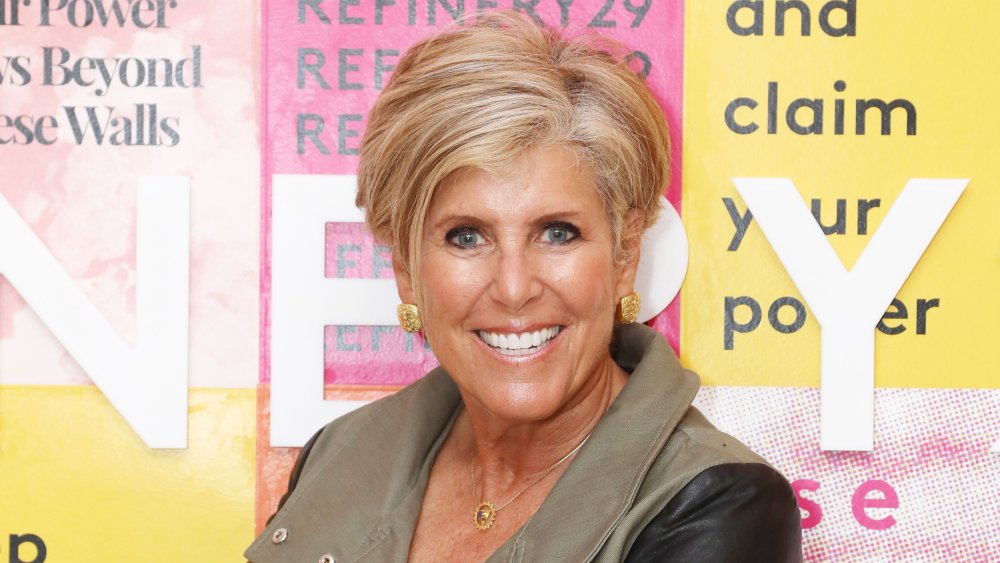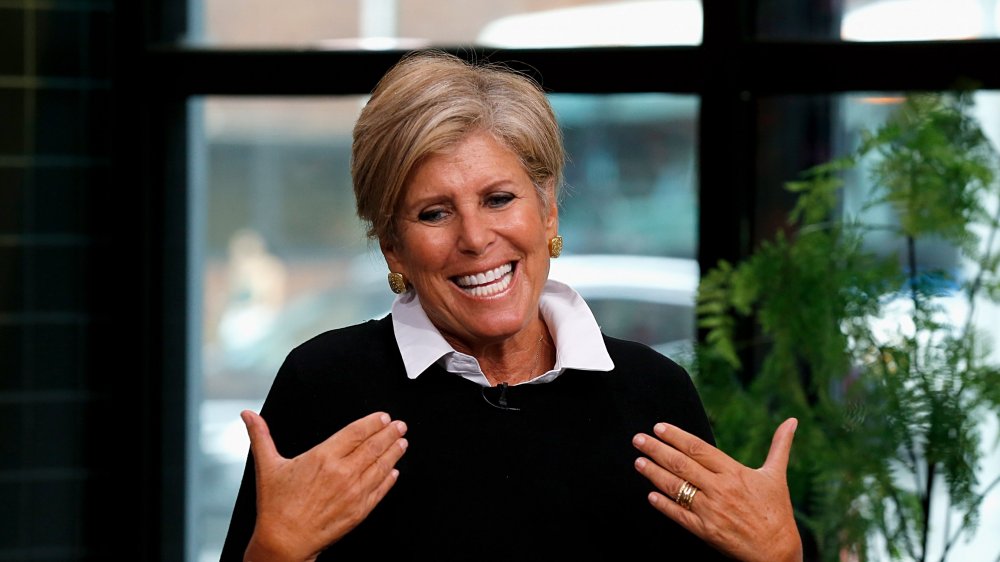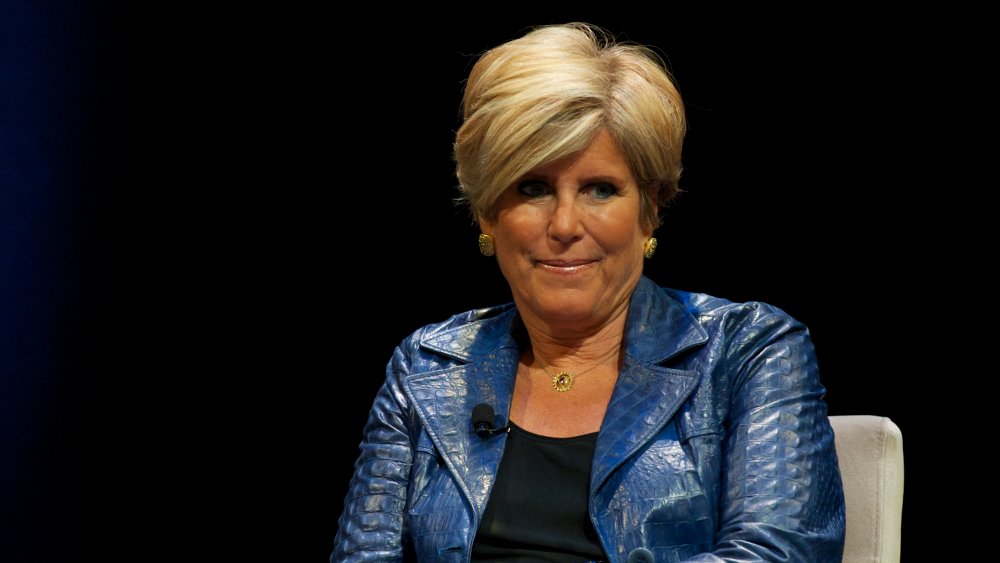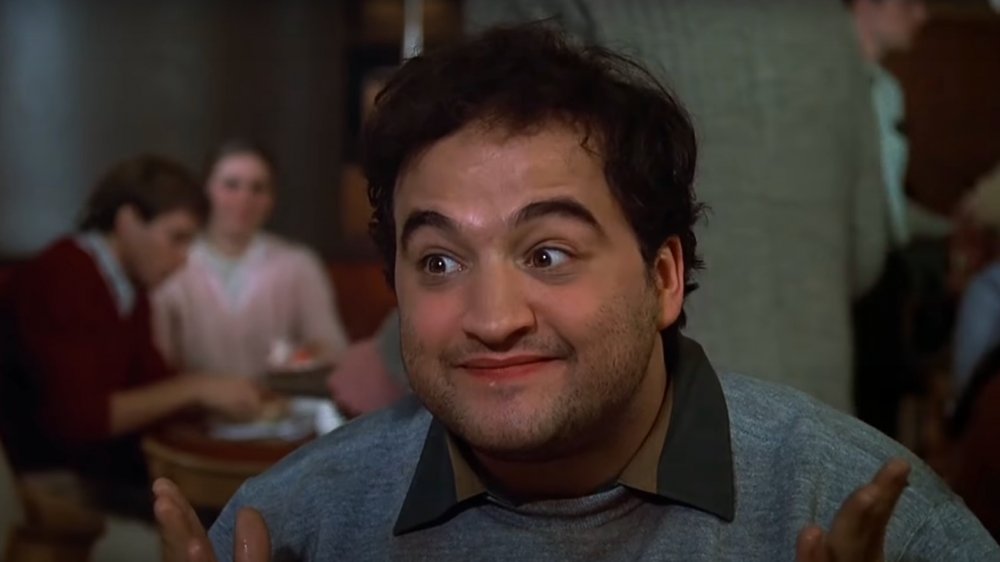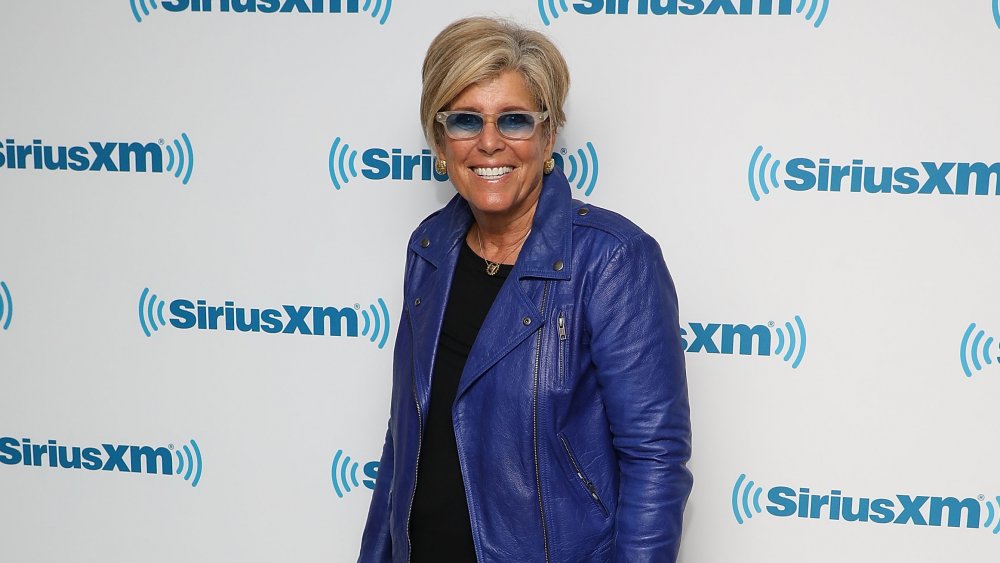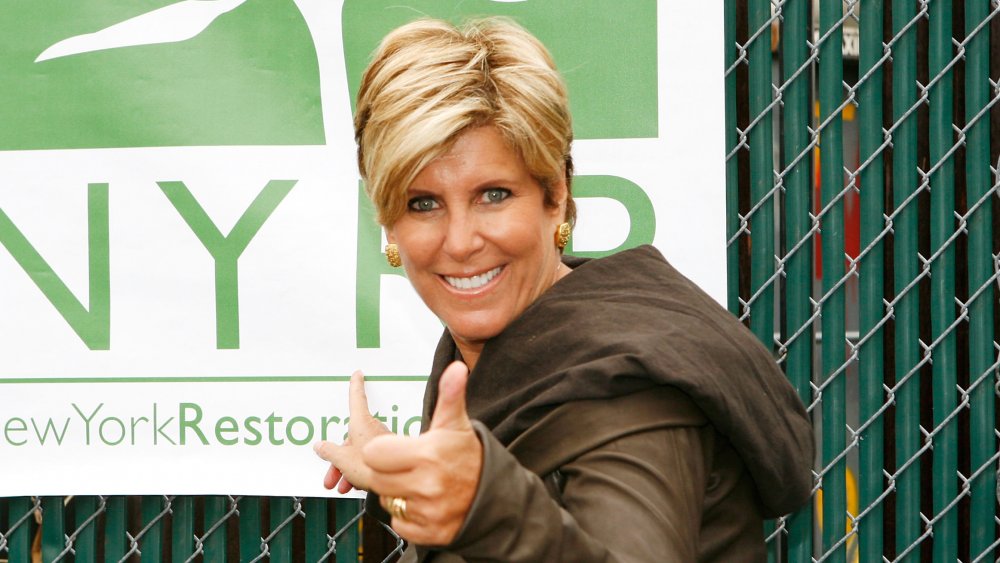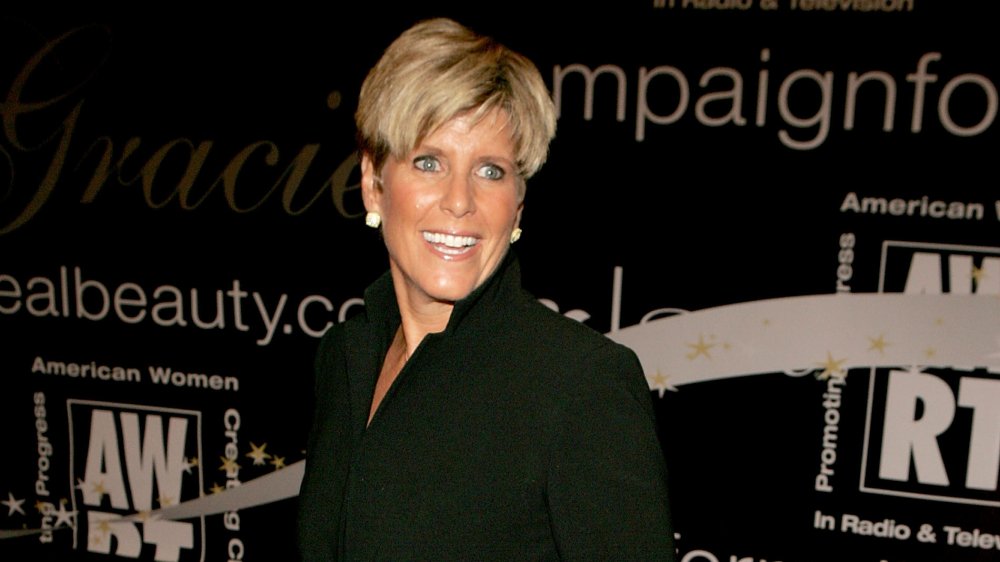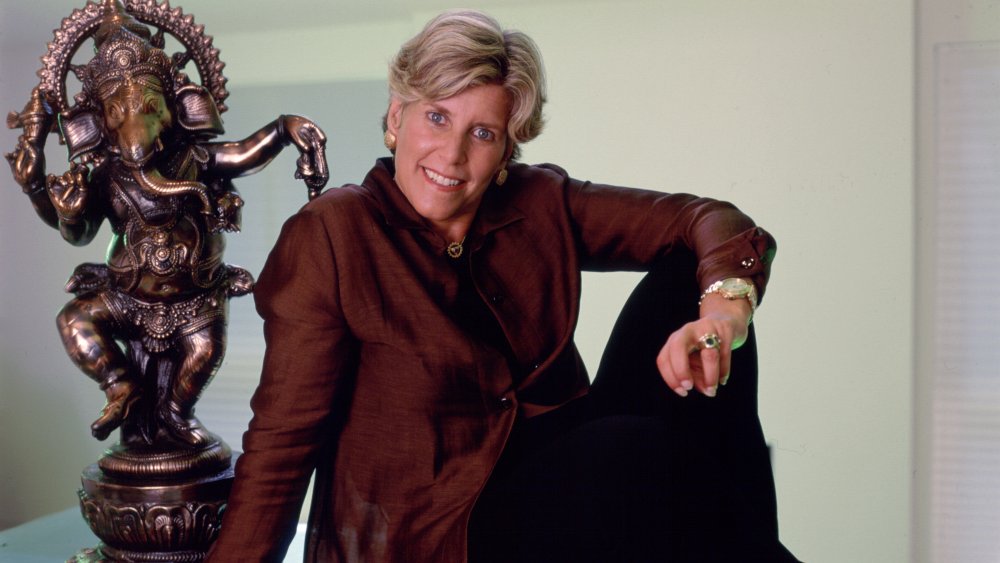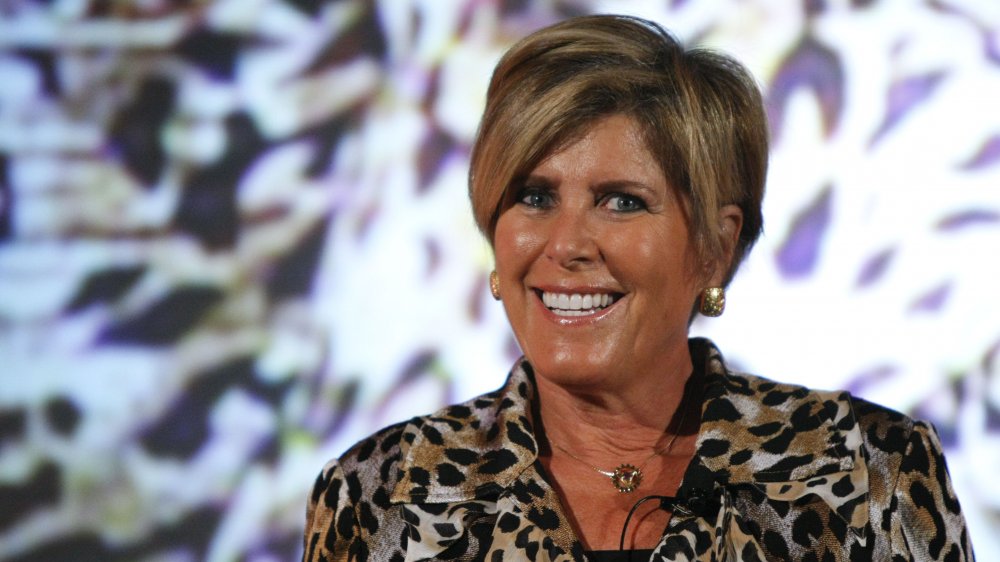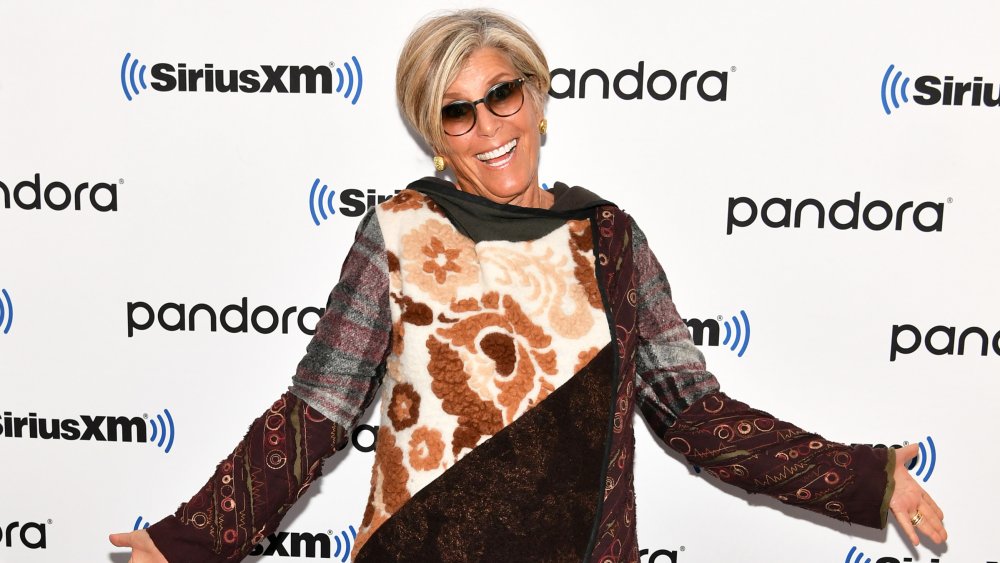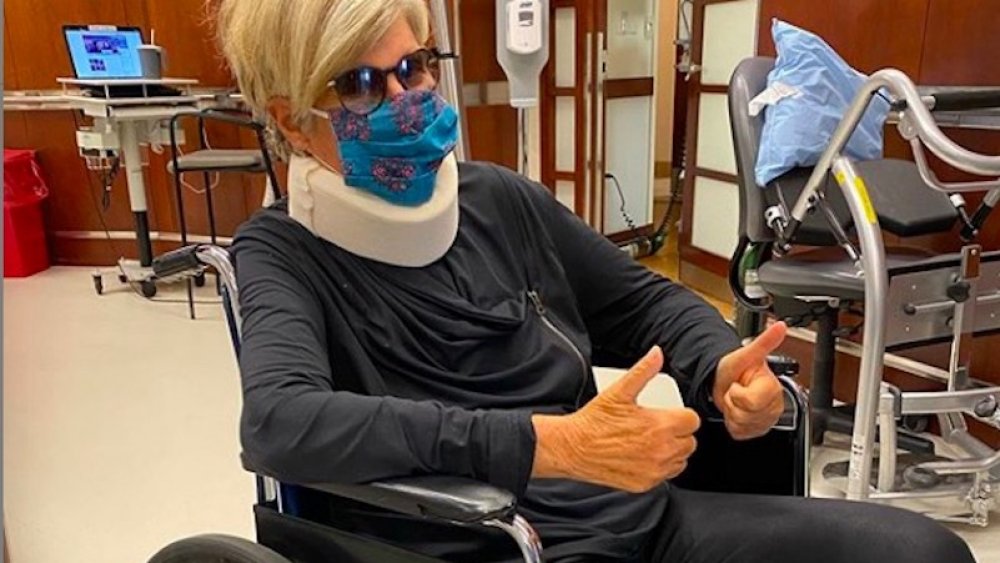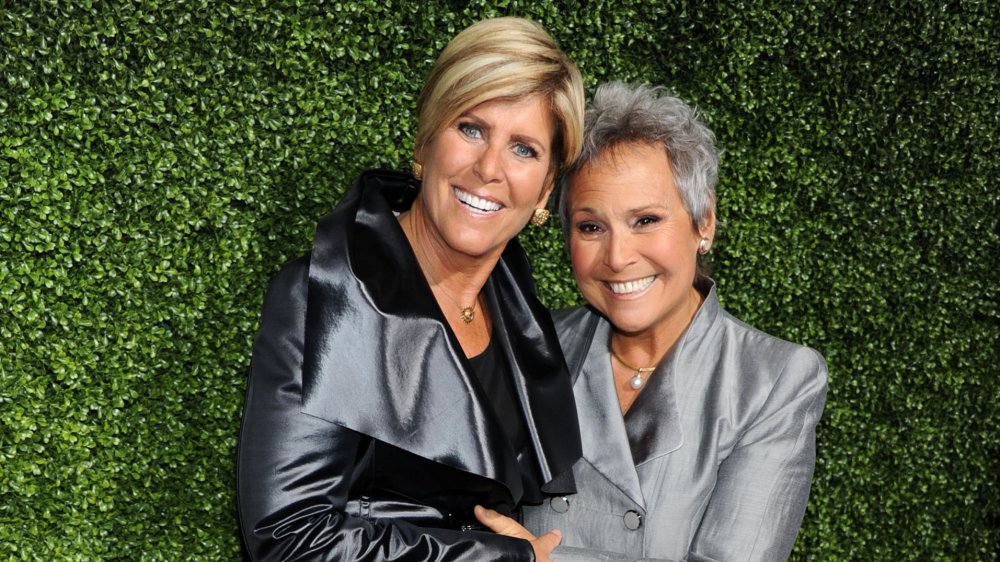The Untold Truth Of Suze Orman
We may receive a commission on purchases made from links.
Suze Orman was far from a household name when she paid her first visit to The Oprah Winfrey Show in 1998. Yet that brief appearance, noted Orman's website, led to 29 full-hour appearances on the top-rated talk show. According to TV Guide, she launched her own CNBC show, The Suze Orman Show, which ran for 13 successful seasons; as CNN pointed out, Orman's show was the cable net's highest-rated Saturday night show, with a quarter-million viewers tuning in each week for blunt, no-holds-barred financial advice
"Money didn't make me powerful," Orman told Oprah.com, explaining her philosophy of money. Orman admitted that "when I first had a lot of money, it served the purpose of showing me exactly how powerless I was." One of the key lessons she imparted was that a person's real value is measured in one's self-worth, not their net worth. "No more letting the external world define me," she said of her personal journey. "I defined me."
Throughout her career, Orman has garnered legions of followers drawn to her tough-love lessons on money management, yet there's probably much about the life of this inspiring self-help guru that even her most ardent fans may not know. Read on to discover the untold truth of Suze Orman.
Growing up in Chicago's South Side shaped Suze Orman
Suze Orman was raised in Chicago's economically disadvantaged South Side, one of the few white, Jewish kids in a predominantly Black neighborhood. In a Q&A with HuffPost, she opened up about her upbringing. She told Ariana Huffington, "It taught me to be very, very tough and it taught me how you had to work for what you needed to get." A similar sentiment came up in an interview with Money, where she said she learned early on that what you want and what you need don't always overlap. "You just do what you have to do," she said.
"I believe that growing up on the South Side, watching the neighborhoods change — because my parents didn't have money to leave — is the best thing to ever happen to me," she shared in an interview with Chicago magazine Splash. "It gave me a compassion and a love and an understanding of life: that the color of our skin does not define who we are, that excellence doesn't come because you were born into private schools and private colleges, that success comes because you know who you are. And I couldn't have learned that anywhere except the South Side of Chicago."
Suze Orman overcame a speech disorder
When she was a young girl, Suze Orman struggled with speech. "I couldn't pronounce my r's, s's, or t's properly, so words such as 'beautiful,' for example, came out as 'boobital," Orman wrote on her website. "To this day, if you listen closely when I speak, you can still hear it." Her speech disorder, she explained, led her to continually "score among the lowest in the class" in reading tests, resulting in being "banished" to the back row in the classroom. "If I always secretly felt dumb, it was now officially confirmed for everyone to see," she added. "Talk about feeling ashamed."
While Orman ultimately overcame her speech impediment, she remained insecure about her academic abilities. When she made it to college, she said in a 2001 speaking engagement, her grades in English remained "horrible," although she did demonstrate a proficiency for math.
Other than financial books, Orman admitted this aversion to reading carried through into her adult life. "I'm probably the only bestselling author you know who's written more books than she's read," she told the audience at the event.
Kristen Wiig's SNL impression is an 'honor'
When Kristen Wiig was in the cast of Saturday Night Live, one of her recurring impersonations was of Suze Orman, who was then hosting CNBC's The Suze Orman Show. As portrayed by Wiig, Orman would offer such money-saving suggestions as her hilarious Halloween tip: instead of buying candy for trick-or-treaters, "collect candy throughout the year from doctors' offices and nursing homes."
"She's got me down," Orman joked in an appearance on Larry King Live after watching part of an SNL sketch, admitting Wiig had kind of gotten into her head. While hosting her show and taking calls from viewers, Orman explained, she found herself becoming confused, wondering whether she was inadvertently doing her own impression of Wiig's impression. "Here's what's going on," she told host Larry King. "I'm playin' me playin' Kristen Wiig playin' me!"
In an interview with Chicago magazine Splash, Orman recalled the time she was in the audience at Saturday Night Live watching Wiig impersonate her. "It was my favorite. Thing. Ever," she declared. "I've won Emmy awards, I've won other awards, but the greatest honor that has been bestowed upon me is [Saturday Night Live]."
An iconic SNL star was Suze Orman's college roommate
A key reason why Suze Orman was so honored to be impersonated on Saturday Night Live was the very personal connection she has with the show, dating back to SNL's beginnings in the mid-1970s.
When she was attending the University of Illinois, she wrote on her website, her roommate was a fellow student named Judy Jacklin, whose "hilarious boyfriend named John Belushi" wound up living with them. Belushi later became one of the original Not Ready for Prime Time Players in SNL's first season before going on to big-screen fame in such movies as Animal House and The Blues Brothers. As a result, Orman maintained a very unique perspective on the show.
"You have to remember that John Belushi, who I lived with in college, went on to become a very famous cast member of Saturday Night Live," Orman explained in an interview for the Archive of American Television. "So Saturday Night Live was something that I watched to watch my friend. It was in my fabric." Being mocked on SNL, she explained, meant "you have made it into the culture of America. You are an icon."
The not-so-inspiring story behind Suze Orman's major
The way Suze Orman tells it on her website, the results of her SATs were so dismal that nobody was more surprised than she was when she was invited to enroll at the University of Illinois. Uncertain of which courses to take, Orman met with a guidance counselor who asked about her aspirations. "I told him that I wanted to become a brain surgeon," she wrote. "He looked at my grades and said, 'I don't think so. You don't have what it takes. Why not try something easier?'"
After a bit of exploration, Orman determined that the absolute easiest program the school offered was a major in social work, "so I signed up for that," she wrote. "Why not take the easy way out? Why try harder?"
While Suze Orman never wound up pursuing a career in social work, she told the National Association of Social Workers that her social-work background has helped her get a handle on how people relate to money. "You have to understand people to understand money," she explained. "People have to go out and earn money. It's people who spend it."
The dream-crushing reason she became a stockbroker
After graduation, Suze Orman went to work — not as a social worker, but as a waitress. As she wrote on her website, after seven years waiting tables, she wanted to open her own restaurant. When her parents were unable to loan her startup capital, she discussed the situation with one of her regular customers. She was blown away when he later handed her a personal check, along with checks from other customers totalling $50,000, along with a note: "This is for people like you, so that your dreams can come true. To be paid back in 10 years, if you can, with no interest."
On her patron's advice, she took the money to Merrill Lynch and opened a money market account. Her broker, Randy, promised he'd be able to earn her $100 a week. Her plans cratered, however, when after just three months "I'd lost all the money in the account."
During that time, she'd been educating herself about the stock market, and had an epiphany. "I said to myself, 'Hey, if Randy can be a broker, I can be a broker, too," she said. She applied for a job and was then hired "at the very office that had lost me all my money."
A Cartier watch taught Suze Orman a life-changing lesson
Working as a stockbroker at Merrill Lynch, Suze Orman started making "serious money," as she described in Oprah.com — a big leap from $100 a week waiting tables.
Having money provided her first opportunity to throw it around, and did she ever. "I drove a fancy car, had a closetful of expensive clothes, wore a watch that cost the equivalent (at that time) of a 25 percent down payment on a house," she said. As she explained, it was all because she "was dating someone who was seriously wealthy, and felt I needed to keep up with the rich crowd I found myself in."
She withdrew money from her 401(k) to order to buy the aforementioned Cartier watch, and before long had racked up $60,000 in credit card debt. In retrospect, she told CNBC, buying the timepiece to impress someone else was "the most stupid thing I've ever done with money." The experience did, however, teach her a lesson she's carried with her ever since. "Stop lying to yourself and live in your truth," she said. "All that matters in life is that you do what's right, versus doing what's easy."
Suze Orman sued Merrill Lynch — while she worked there
It's not often that employees sue the company they're working for while still working there, yet that's precisely what Suze Orman did while she was a broker at Merrill Lynch. As she explained in an interview with Your Financial Pharmacist, she was hired by the firm "to fill their women's quota." While she was working at Merrill Lynch, learning the ropes, she came to realize that the broker who'd lost her $50K hadn't been acting within the bounds of the law when he'd done it.
"And so while I was working for them, I sued them with the help of somebody who worked for Merrill Lynch who told me what had happened to me was illegal," she continued. "And because I sued them, they couldn't fire me." During the two years it took for the case to come to trial, she said, she'd become "their No. 6 producing broker."
As Orman told Think Advisor, "The case never went to court. Merrill knew that I had them. So they settled. They knew. And I knew."
Suze Orman's Oprah debut took some convincing
Suze Orman is one of the many experts to go on to solo fame by appearing on The Oprah Winfrey Show. In fact, she told ABC News, after just a few appearances people stopped referring to her by name and instead called her "Suze from the Oprah show." Funnily enough, Orman turned down the first invitation. Years later, she explained why in an interview with Oprah Winfrey's OWN network, revealing she was initially asked to weigh in on "the spiritual side of divorce," but was hesitant "because I wasn't an expert in divorce."
Orman eventually relented. When she joined Winfrey onstage, she admitted, she was "shaking... I'm sweating." Winfrey calmed her and asked her an unexpected question: "Suze, what is the key to life?" Orman responded with an off-the-cuff personal anecdote, explaining that once she started making money she "was still empty." Orman ultimately discovered "that when you can be as happy in your sadness as you are in your happiness, then you know the key to life."
Winfrey was impressed. "She said... 'We're going to have to do an hour show on you.' And with that, she gets up and walks off," Orman recalled.
Why Suze Orman isn't like most financial advisers
Suze Orman is aware that she's not a typical financial adviser. She elaborated on that in an interview with the Archive of American Television.
"I didn't grow up with money, I didn't marry money, I didn't ever think I would be this way," Orman explained. "So what sets me apart from other financial advisers is that I never thought I was going to be a financial adviser." According to Orman, a lot of so-called financial advisers who appear on television "didn't have the experience that I did, growing up without. Didn't have the experience of being a waitress til they were 30."
While Orman conceded that those who position themselves as financial advisers on television "may be knowledgeable and they may be great," she also felt "they're unrelatable" to the average viewer. "They have pinstripe suits, I have leather jackets. They have skirts and dresses and high heels, I wear pants and cowboy boots." Orman's point: "I am of the people. I'm for the people. I'm doin' it for a different reason. I don't have money under management, I'm not lookin' for that."
Unsurprisingly, Suze Orman's done well for herself
While Suze Orman may not have been born into wealth, she certainly earned a pretty penny over the years. According to Celebrity Net Worth, the former host of The Suze Orman Show is worth an estimated $75 million, thanks to savvy investments, her television work, book deals, public speaking fees and other income sources. Her net worth had clearly grown substantially since 2007, when she told The New York Times, "One journalist estimated my liquid net worth at $25 million. That's pretty close. My houses are worth another $7 million."
And while Orman has built a reputation for preaching a gospel of financial austerity, she admitted in that same interview that she had one very expensive indulgence. "My greatest pleasure is still flying private," she admitted, estimating that she spent "between $300,000 to $500,000" per year on travelling via private jet.
In fact, Orman declared she was so financially comfortable that she had a hefty amount of money she was willing to gamble. "I have a million dollars in the stock market," she told the Times, "because if I lose a million dollars, I don't personally care."
Suze Orman gave the retirement life a try
When CNBC's The Suze Orman Show ended its run in 2015, its host decided the time was right to make an exit. As a result, Orman and wife Kathy "KT" Travis retired to the Bahamas, living on a private island. Speaking with The Cut in 2019, Orman explained why she opted to retire at such a relatively young age. "When I was approaching 65, I noticed something about a lot of people who had been on the same shows I was on — The View, or Larry King Live: They needed to be defined by a standing ovation, by an audience," she said.
That in mind, she ended her show, slammed the breaks on her speaking engagements and TV appearances and sold off properties and assets. "Gone. Bye! Everyone thought I was having a nervous breakdown," she admitted.
Full-time retirement, however, didn't take. Inspired by the #MeToo and Time's Up Movements, Orman returned to the limelight with a new goal. "I want women to stand up for themselves, financially speaking," she added. "But I'm not doing it for the money. I don't need the money. I have more money than I'll ever spend."
A tumor could have paralyzed Suze Orman
During 2020, Suze Orman suffered a significant health setback. As CNBC reported, Orman had been experiencing an array of worrying symptoms, including extreme difficulty walking up stairs and a loss of sensation in her right hand. While she feared a serious ailment, she also didn't want that to be the outcome. "I knew something was wrong and I wanted to believe the doctors that didn't give me the correct advice because I wanted them to be right," she admitted.
Finally, she received a diagnosis that explained everything: a benign tumor that had been growing for 15 years was now so large it was now putting pressure on her spine. She recalled hearing her doctor say, "This is serious... You have got to get a neurosurgeon and you've got to do it right away." She ultimately underwent successful surgery to remove the mass, with two herniated discs in her spine replaced by titanium ones.
During an October 2020 appearance on NBC's Today, Orman admitted, "I was one fender bender away from being paralyzed and a quadriplegic." Had things gone another way, she conceded, "I wouldn't have had anybody to blame but myself."
Suze Orman learned a big lesson from her health scare
If Suze Orman has demonstrated any one characteristic throughout her life, it's that she sees every hardship encountered as an opportunity to learn and grow. Being diagnosed with a tumor on her spine after months of convincing herself her symptoms weren't as bad as they really were, she told The Tamron Hall Show, proved to be a major wakeup call.
"For years, I've been known for the saying, 'People first, then money, then things,'" Orman said of the crucial lesson she'd learned. "My new saying is 'Health first, then money, then things.' You can have all the money in the world ... but without your health, it means absolutely nothing."
"Suze learned a huge lesson: and that lesson is when your body speaks to you, listen," Orman's wife, Kathy "KT" Travis, told People. "Suze always spent her life taking care of everybody else. She takes care of millions of strangers. She takes care of me. She takes care of our family. She's always, always putting people first. That's her credo: People first, then money, then things. Now I think she's learned that she needs to listen to her own body. It was shouting at her."

